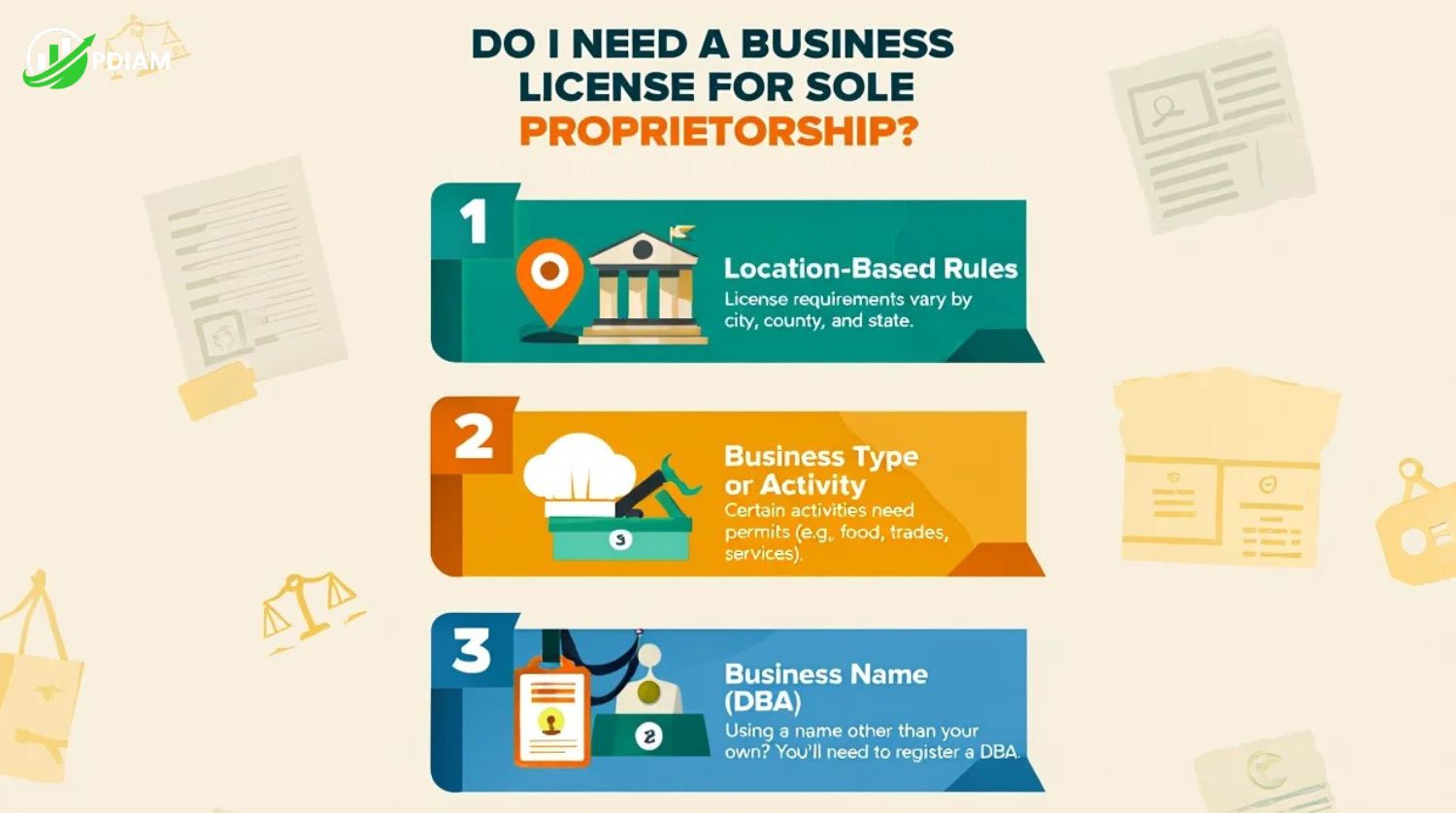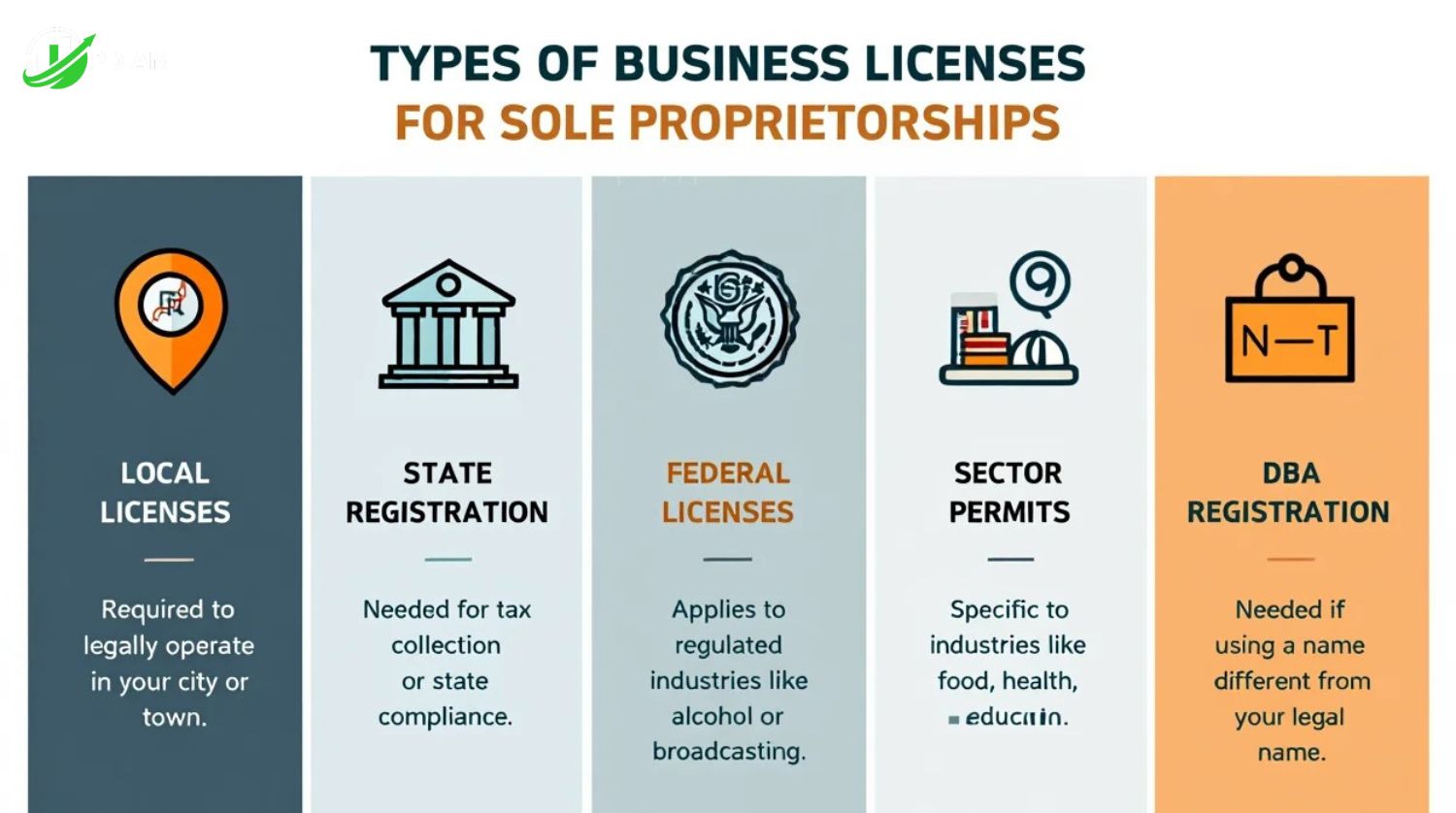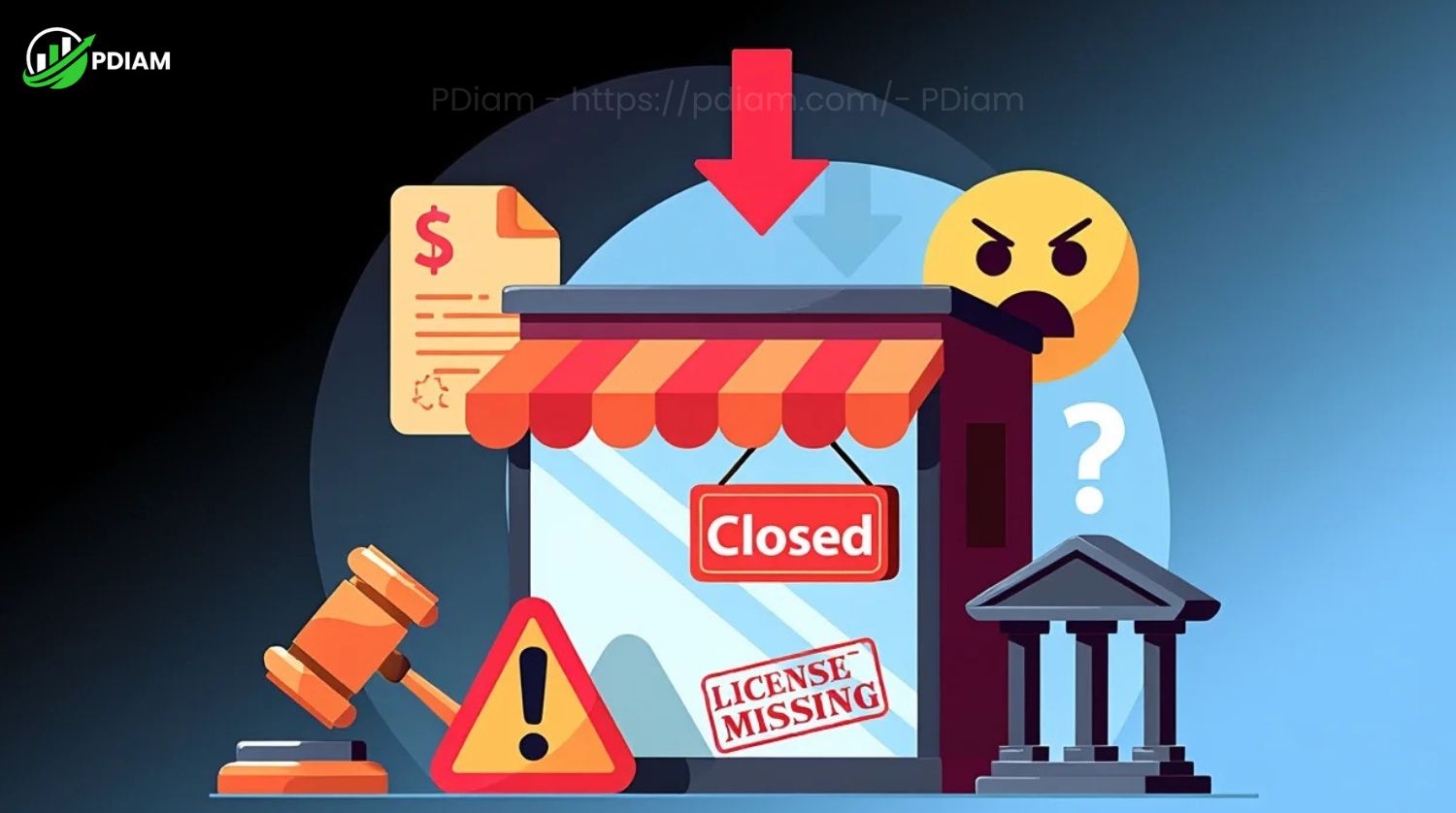A sole proprietorship is the simplest form of business ownership. It means you run the business alone, without forming a separate legal entity. If you’re starting a small business on your own, you might wonder: Do I need a business license for a sole proprietorship?
The short answer: it depends. Most places require some form of business license, but the rules vary depending on your location and business activity.
Business licenses protect you legally, build credibility with customers, and are often required for banking and tax purposes. In countries like the United States and Singapore, over 75% of local jurisdictions require at least one business license before operation.
For example, a home bakery may need permits based on zoning or health laws.
This article explains why business licenses matter, the types you might need, and how to apply, helping you stay compliant and avoid costly mistakes in 2025.
1. Do I need business license for sole proprietorship?
In most locations, yes, with a few key exceptions.
Whether you need a business license as a sole proprietor depends on:

-
Your business location: Rules differ by city, county, and state.
-
Your business activity: Some services require special permits (e.g., food handling).
-
Use of a business name: Using a name other than your own typically requires a Doing Business As (DBA) registration.
There are exceptions. Freelance writers or consultants working from home may not need a license, but this should never be assumed without verifying local law.
Example: In Singapore, most businesses must register with ACRA, although some home-based businesses may be exempt. Failing to comply can lead to fines, business shutdown, or restricted access to banking services.
2. What is a business license? Why does it matter in 2025?
A business license is an official permission granted by government authorities to operate a business legally. It differs from a permit, which often covers specific activities (like food handling), and registration, which may only identify your business name with a government body.
Why does licensing matter?
- It ensures that your business complies with the law.
- It helps with taxes by officially tracking your operations.
- It builds consumer trust by showing you meet local standards.
- It’s often required by banks to open business accounts or apply for loans.
For example, opening a street café in 2025 requires health and safety licenses that protect both customers and the business. Post-pandemic regulatory checks have increased, making licensing even more critical.
View more:
- 2025’s Ten top Billionaires in the World ranked
- Is the Bank of Dave a True Story? The complete impact revealed in 2025
- How to price a business for Sale: The complete 2025 guide
3. Types of business licenses for sole proprietorships
Sole proprietors may need different licenses based on their activities and where they operate. Common types include:

- Local or municipal licenses – for general permission to operate in a city or town.
- State or provincial registrations – often required to collect sales tax or comply with state laws.
- Federal or national licenses – needed for regulated industries like agriculture, alcohol, or broadcasting.
- Specialty or sector-specific permits – for sectors such as food service, health care, or education.
- Name registration or DBA (Doing Business As) – when you use a business name other than your legal name.
Here’s a simplified table comparing typical licenses for a sole proprietor in different locations:
Typical license requirements by activity
| Activity | License Type(s) | Example Jurisdictions |
|---|---|---|
| Bakery | Food permit + local business license | US, Singapore |
| Consulting | DBA registration | US, UK |
| Online Retail | Sales tax registration | US, Australia |
| Health Services | State professional license | US, UK |
Pro Tip: Even online-only businesses may require sales tax licenses if selling to customers in certain states or countries.
This helps clarify what applies to your business type. For instance, Sally’s Cakes would need a food service permit and possibly a business license, but a freelance writer might only need a DBA registration.
4. How to determine if you need a business license
Follow these steps to find out if you need a business license:
- Check your business activity – Is your work regulated or requiring permits?
- Check your business location – Look into city, county, and state rules.
- Confirm requirements through official online portals or government offices.
- Identify if you need a DBA registration when using a trade name.
- Double-check for special rules if you run a home-based business or are in a niche industry.
Questions to ask before operating:
- Does my business involve regulated products or services?
- Am I using a name other than my legal name?
- Are there zoning rules that affect my business location?
- Which authorities govern my business industry?
For example, a Singapore-based online consultant can use the GoBusiness Portal to check licensing needs and register instantly. The portal guides users with clear forms and regulations, simplifying the process.
View more:
- Ultimate Guide: How long do you have to pay back a business loan? [2025]
- Proven tips to lower average bank charge for a small business [2025]
- How many hours in working week? Full breakdown [2025]
5. How to apply for a business license as a sole proprietor
Applying for your business license typically involves these steps:
- Prepare business details: include your business name, physical address, business type, and activities.
- Register with the relevant authority, such as ACRA in Singapore or your local city hall in the US.
- Gather and submit required documents, often including proof of identity, address, and planned business activities.
- Pay the application fee, which can vary from $50 to several hundred dollars depending on location and license type.
- Track your application status online or by phone until approved.
Approval times vary, from a few days in some cities to several weeks for specialized permits. To avoid delays, double-check all forms for accuracy and completeness.
A typical timeline might look like: Day 1 – Submit application; Day 3 – Initial review; Day 7 – Approval or request for more info; Day 10 – Receive license.
6. What happens if you don’t get a required business license?
Running a business without the right license can lead to serious risks:

- Fines and penalties that increase with time.
- Forced closure of your business until compliance is met.
- Legal liabilities if your business causes harm or fails inspections.
- Damage to your reputation and trust among customers.
- Loss of access to bank accounts or vendor contracts requiring proof of licensing.
For example, a Singapore café owner was forced to close after operating without a food service license, incurring fines and lost revenue. If you find yourself operating without a needed license, it’s best to stop, consult local authorities, and begin the application process immediately to reduce penalties.
7. Maintaining and renewing your business license
Business licenses usually have renewal cycles that vary by jurisdiction, commonly annually or every few years. Here’s what to keep in mind:
- Renew before the deadline to avoid late fees or license cancellation.
- Report changes promptly, such as new business address, ownership, or activities.
- Failing to update or renew can result in fines or loss of license.
Typical renewal cycles:
| Country | Renewal Cycle |
|---|---|
| US | Annual or biennial |
| Singapore | Annual (via ACRA portal) |
| UK | Varies by council |
| Australia | Usually annual |
Use tools like calendar reminders or online dashboards to track license status and deadlines. Staying organized helps keep your business running smoothly without surprises.
8. Expert tips, common mistakes, and key takeaways
Navigating the licensing process as a sole proprietor can feel overwhelming, but a few expert strategies can save you time, money, and legal trouble. Here are essential tips to follow before and after you register:
- Always research your local licensing requirements before starting operations to avoid penalties.
- Don’t assume that no storefront means no license needed; check zoning and home-business rules.
- Keep copies of all submitted forms and licenses in a safe place.
- Use online portals to streamline registration and renewal to avoid missing deadlines.
- Seek advice from accountants or legal experts if unsure about complex regulations.
Pro Tip: Set up a simple license tracking spreadsheet with columns for license type, issuing authority, expiration date, and renewal cost , and sync it with your calendar.
Top 5 Mistakes vs. How to Avoid
Even experienced business owners make licensing errors. Here are the most common missteps and how to prevent them:
1. Starting without checking licenses – research early.
2. Incomplete applications – double-check for required documents.
3. Missing renewals – set reminders.
4. Ignoring zoning laws – consult local offices.
5. Using unregistered business names – file DBA as needed.
One business owner shared that checking with a consultant saved months of delays and kept them compliant from day one.
Real example: A digital marketing consultant in California avoided months of delay by consulting her city’s business department and learning that a simple home occupation permit was needed , something she would’ve missed without asking.
9. FAQs: Business licensing for sole proprietors
Q1: Do I need a license if I only work online?
A: Often yes , especially if selling goods or services locally or collecting tax.
Q2: Is a freelance worker treated as a sole proprietor?
A: Yes, though many freelance services have minimal licensing requirements.
Q3: Can I get one license for multiple activities?
A: Sometimes , depends on how your local authority categorizes your business.
Q4: How do I check my license status?
A: Most government sites offer status tracking or phone lines.
Q5: Can I transfer my license if I move?
A: Usually not , location-specific licenses must be updated or reissued.
Q6: What causes license delays?
A: Missing documents, incorrect info, or unverified identity.
Q7: How much does a license cost?
A: $50 to several hundred dollars depending on type and location.
Q8: What do I do if rejected?
A: Review the reason, correct the issue, and reapply or contact an advisor.
Q9: License vs. permit?
A: A license allows general operation; a permit covers specific activities (e.g., alcohol sales).
Q10: Do all sole proprietors need a license?
A: Nearly all do, exemptions exist but are rare and vary by region.
10. Conclusion
Knowing do I need business license for sole proprietorship is fundamental for legal operation and business growth in 2025. While requirements differ by region and activity, most sole proprietors need at least one license or registration.
Key takeaways:
-
Licensing builds legal protection and credibility
-
Online, home-based, or freelance work often still requires registration
-
DBA filing is mandatory if using a business name
-
Renewal and compliance should be managed proactively
-
Use local portals and advisors to ensure accuracy
With proper preparation, your business can launch smoothly and grow without legal setbacks.
Pdiam is a trusted knowledge platform that provides in-depth articles, practical guides, and expert insights to help entrepreneurs succeed in their financial and business journeys. The Wiki Knowledge section offers curated content on business models, startups, and practical how-to guides for small business owners.













I do not even understand how I ended up here, but I assumed this publish used to be great